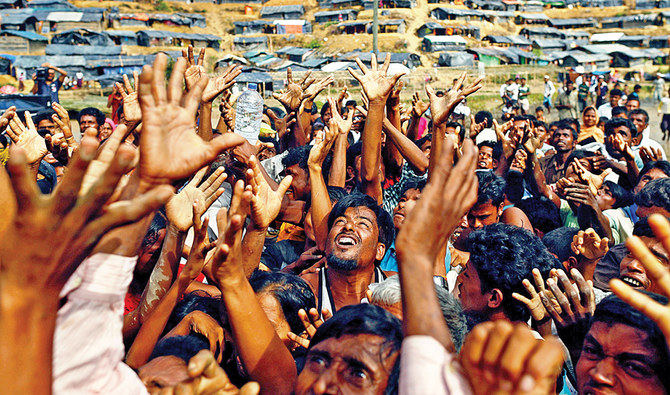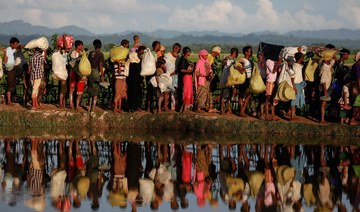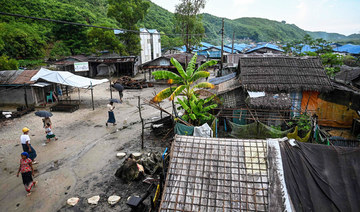DHAKA: Several members of the Rohingya community in Bangladesh’s Cox’s Bazar expressed optimism on Monday that the International Court of Justice (ICJ) would rule in their favor once it began its three-day hearing against Myanmar on Tuesday.
The case was filed by Gambia on behalf of all Muslim nations from the Organization of Islamic Cooperation (OIC) with the ICJ over the alleged persecution of the Rohingya by the Myanmar military.
On Nov. 18, the court decided to hold the hearings from Dec.10 to 12. Gambia’s justice minister will lead his country during the hearings.
Both Canada and Bangladesh have been supporting Gambia by providing different data and information regarding the atrocities against the Rohingya.
Myanmar’s state councillor and its de facto leader, Aung San Suu Kyi, has already reached the Netherlands to lead the defense lawyers on behalf of her country at the ICJ.
Bangladesh Foreign Secretary Shahidul Haque will remain present at the courtroom to witness the process.
He will lead a 20-member team, comprising government officials and civil society representatives.
Rohingya at Cox’s Bazar are highly optimistic of securing justice at the ICJ.
“We think justice will be ensured because all international human rights groups, different UN organizations and the international community have got evidence of the persecution on the Rohingya. All of them have visited the refugee camps many times and listened to the plight of the Rohingya,” Sawyed Ullah, a community leader from Jamtoli, told Arab News.
“Also, we have strong evidences of atrocities committed by the Myanmar government to root out the Rohingya from their birth place, Rakhine,” Ullah added.
“Without ensuring accountability, there will not be any safety and justice in Rakhine. Once the accountability is restored, all of us will be able to go back home.”
Ramjan Ali, another refugee from the Kutupalang camp, said: “Myanmar’s government has forcibly displaced the Rohingya from their own land and that compelled us to shelter here at the refugee camps. Isn’t it enough evidence to justify our allegations against the Myanmar government?”
Ramjan Ali added: “Still the situation in Rakhine is very bad as we receive information from our relatives over there. We need protection from the international forces before any repatriation, and the ICJ’s decision will be helpful for us in this regard.”
Rohingya human rights activist Nay San Lwin, co-founder of the German-based Free Rohingya Coalition described the ICJ’s move as historic.
“It is first ever since we are persecuted. We have been seeking for justice since very long time,” Lwin told Arab News, adding that “finally the case is now at the world court and although it will take several years we are now excited for provisional measures from the court.”
Lwin, along with some 200 Rohingya rights activists from around the world, is set to hold a protest rally at the Hague from Dec. 11 during the ICJ’s hearing.
“We are expecting very much from the ICJ. Regardless whether Myanmar follows the decisions of the court this will have a huge impact. There won’t be any other justice mechanisms if this international court of justice can’t ensure the justice for us,” added Lwin.
Expressing his frustration on the repatriation process, Lwin said that the Myanmar government still had a “genocidal policy” on the Rohingya.
“I don’t think repatriation of the Rohingya will take place soon unless the government is considering to fulfill our demands,” he said.
The ICJ’s final decision will hold strong significance as any decisions taken by the ICJ are binding on member states.
Both Gambia and Myanmar are signatories of the Genocide Convention.
























